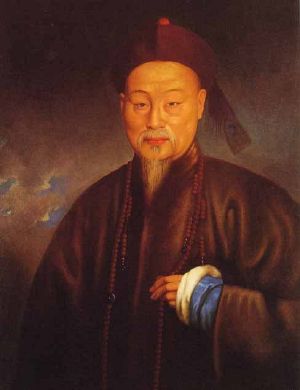Lin Zexu
- This is a Chinese name; the family name is Lin.
Lin Zexu (Traditional Chinese: 林則徐; pinyin: Lín Zéxú) (August 30, 1785 – November 22, 1850), also known as Lin Tse-hsu, was a Chinese scholar and official during the Qing dynasty. He is most recognized for his fight against opium smuggling into Guangzhou, which is considered to be the primary catalyst for the First Opium War of 1839–42.
Early life and career
Lin was born in Fuzhou, in the Fujian province. In 1811, he received the Jinshi degree, one of the highest titles in the imperial examinations, and the same year, he was appointed to the prestigious Hanlin Academy. He rose rapidly through various grades of provincial service and became Governor-General of Hunan and Hubei in 1837.
Campaign to suppress opium
A formidable bureaucrat known for his thoroughness and integrity, Lin was sent to Guangdong to halt the importation of opium from the British prior to the First Opium War (1838). He confiscated more than 20,000 chests of opium already at the port and supervised their destruction. He later blockaded the port from European ships. Lin also wrote a letter to Queen Victoria of Britain warning her that China was adopting a stricter policy towards everyone, Chinese or foreign, who brought opium into China. This letter expressed a desire that Victoria would act "in accordance with decent feeling" and support his efforts. The letter was never delivered to the queen, though it was published in The Times.[1] Open hostilities between China and Britain started in 1839.
Lin grossly overestimated the military capacity of his own forces and underestimated that of the British warships. The subsequent military debacle led to his replacement by Qishan in September 1840. As punishment for his failures, he was demoted and sent to exile in Ili in Xinjiang. However, the Chinese government still considered Lin to be an official of rare virtue and sent him off to take care of difficult situations.
Death and legacy
He died in 1850 while on the way to Guangxi, where the government was sending him to help put down the Taiping Rebellion. He was a patriot of ability who attained an international reputation as "Commissioner Lin." He was opposed to the opening of the country but felt the need of a better knowledge of foreigners, which drove him to collect much material for a geography of the world. He later gave this material to Wei Yuan, who published an Illustrated Treatise on the Maritime Kingdoms (Hǎiguó túzhì 海國圖志) in 1844.
June 3, the day when Lin confiscated the crates of opium, is celebrated as Anti-Smoking Day in the Republic of China in Taiwan. Manhattan's Chatham Square, in Chinatown, contains a statue of Lin, commemorating his early struggle against drug use.
Influence
Although he was not seen as such until well into the twentieth century, Lin Zexu is now seen as a National hero for Chinese people; he is now one of the symbols of China's resistance to imperialism. No less than three films have been made on his role in the Opium Wars, and his policies are accepted as brave rather than pugnacious, defensive rather than provocative.
Reference
- ↑ The Opium Wars Hanes, W. Travis, et al, pg. 41 ISBN 0-7607-7638-5
- Hummel, Arthur William, ed. Eminent Chinese of the Ch'ing Period (1644-1912). 2 vols. Washington: United States Government Printing Office, 1943
- Arthur Waley The Opium War Through Chinese Eyes (London: Allen & Unwin, 1958; reprinted Stanford, California: Stanford University Press, 1968)
- Hsin-pao Chang, Commissioner Lin and the Opium War (Cambridge, Massachusetts: Harvard University Press 1963)
See also
- Prohibition (drugs)
- War on Drugs
External links
- This article incorporates text from an edition of the New International Encyclopedia that is in the public domain.
cdo:Lìng Cáik-sṳ̀
Credits
New World Encyclopedia writers and editors rewrote and completed the Wikipedia article in accordance with New World Encyclopedia standards. This article abides by terms of the Creative Commons CC-by-sa 3.0 License (CC-by-sa), which may be used and disseminated with proper attribution. Credit is due under the terms of this license that can reference both the New World Encyclopedia contributors and the selfless volunteer contributors of the Wikimedia Foundation. To cite this article click here for a list of acceptable citing formats.The history of earlier contributions by wikipedians is accessible to researchers here:
The history of this article since it was imported to New World Encyclopedia:
Note: Some restrictions may apply to use of individual images which are separately licensed.

